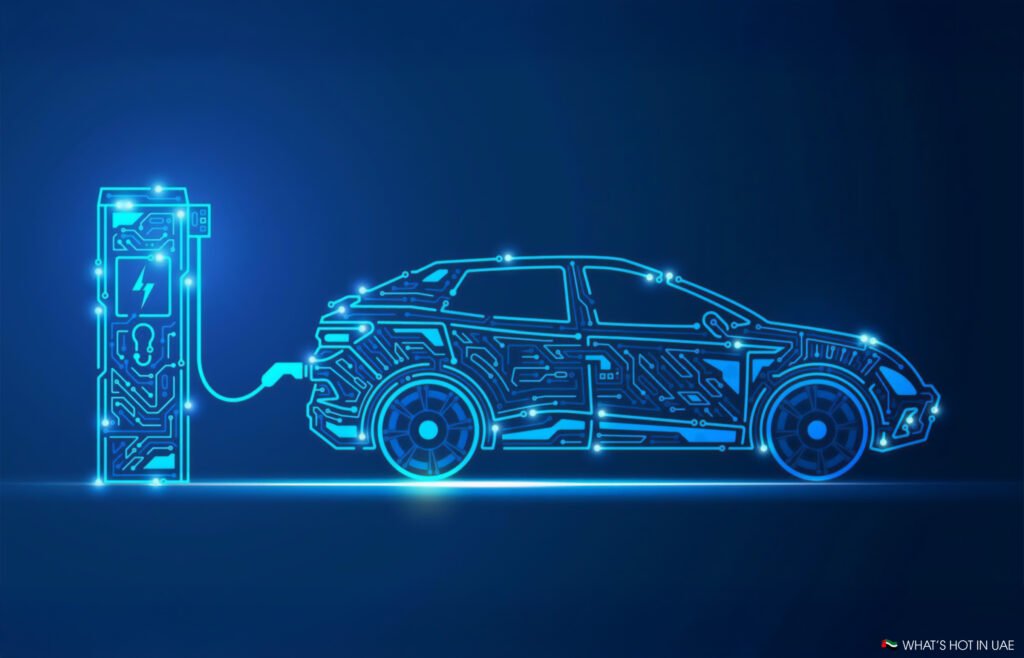Watching the petrol prices change each month can feel like a rollercoaster you didn’t sign up for. That sharp intake of breath at the pump, the quick mental calculation of your daily commute—it’s a familiar feeling for every driver in the UAE. But what if there was a way to step off that ride and embrace a smarter, cheaper, and cleaner way to drive? The answer is already cruising down Sheikh Zayed Road: electric vehicles in the UAE (EVs).
The shift to electric isn’t just a global trend; it’s the future of driving right here in the Emirates. Yet, for many, the idea is clouded with questions. Is it really cheaper? Where do I charge it? Can it handle a long drive in the summer heat?
Consider this your ultimate owner’s manual for making the switch. We’re cutting through the noise to give you a data-driven, practical guide to EV ownership in the UAE for 2025. We’ll break down the real financial savings, demystify the charging process from Dubai to Abu Dhabi, help you choose the perfect EV for your lifestyle, and show you why the UAE is one of the best places in the world to go electric. It’s time to trade petrol pain for electric gain.
The ‘Why’: Unpacking the Real Cost of Driving in the UAE
Before diving into the solution, it’s crucial to understand the true cost of sticking with a traditional petrol car. The expense isn’t just what you pay at the pump; it’s also the environmental price our cities pay. Hard data reveals a compelling case for making the switch to electric.
Feeling the Pinch at the Pump: A Look at UAE Petrol Prices
The monthly announcement from the UAE Fuel Price Committee has become a source of anxiety for many households. These prices, which are deregulated and tied to global oil market fluctuations, can significantly impact your budget.
Here are the official fuel prices for October 2025, as announced by the committee[1]:
- Super 98: Dh2.77 per litre
- Special 95: Dh2.66 per litre
- E-Plus 91: Dh2.58 per litre
- Diesel: Dh2.71 per litre
A single month’s price doesn’t tell the whole story. The real issue is the volatility. To illustrate, here’s a look at how prices for Special 95 have fluctuated over the past year, showing the unpredictable nature of fuel costs.
| Month (2024-2025) | Price (AED) |
|---|---|
| November 2024 | Dh2.59 |
| December 2024 | Dh2.65 |
| January 2025 | Dh2.70 |
| February 2025 | Dh2.78 |
| March 2025 | Dh2.85 |
| April 2025 | Dh2.92 |
| May 2025 | Dh2.88 |
| June 2025 | Dh2.81 |
| July 2025 | Dh2.75 |
| August 2025 | Dh2.79 |
| September 2025 | Dh2.60 |
| October 2025 | Dh2.66 |
This constant fluctuation makes financial planning difficult and directly contrasts with the stable, predictable cost of charging an electric vehicle at home.
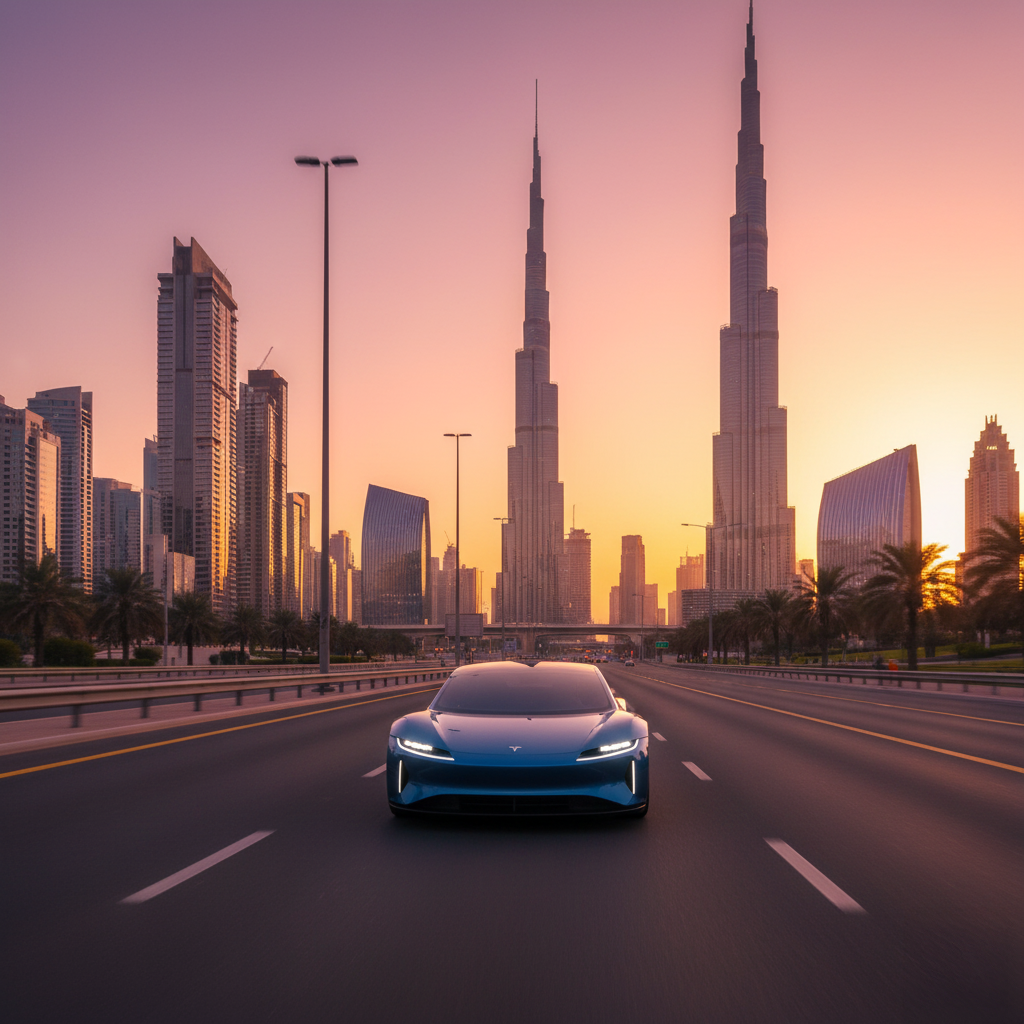
The Hidden Cost: How Car Pollution Affects Life in Dubai
Beyond the financial strain, there’s a significant environmental and health cost associated with petrol and diesel vehicles. Vehicle emissions are a primary contributor to air pollution in urban centers like Dubai.
The main concern is fine particulate matter, known as PM2.5. These microscopic particles can penetrate deep into the lungs and enter the bloodstream, causing serious health issues. According to air quality monitoring platform IQAir, Dubai’s air quality often exceeds the safety guidelines set by the World Health Organization (WHO)[2].
For instance, in 2019, Dubai’s annual average PM2.5 concentration was 40.9 μg/m³, which is over eight times the WHO’s recommended guideline of 5 μg/m³[3]. At certain times, these levels can spike dramatically; in June of one year, Dubai’s PM2.5 level reached 59 μg/m³, placing it firmly in the ‘unhealthy’ category[2]. This pollution contributes to respiratory problems and diminishes the overall quality of life.
The UAE government recognizes this challenge. As part of its forward-thinking National Electric Vehicles Policy, the transport sector is targeted for a 20% reduction in energy consumption, a goal in which zero-emission vehicles play a pivotal role[4].
The ‘Gain’: Quantifying the Benefits of Owning an EV in the UAE
Switching to an electric vehicle isn’t just about avoiding the negatives of petrol cars; it’s about embracing a host of tangible benefits. From significant financial savings to exclusive government perks, the advantages of EV ownership in the UAE are concrete and compelling.
Slash Your Running Costs: Charging vs. Fueling
The most immediate and impactful benefit of owning an EV is the dramatic reduction in “fuel” costs. Research shows that EV owners in the UAE spend approximately a quarter of what traditional car owners do on fuel. Let’s break that down with a real-world example.
Scenario: Driving 2,000 km per month
- Petrol Car (e.g., Toyota RAV4, ~12 km/litre):
- Litres needed: 2,000 km / 12 km/l = 167 litres
- Monthly cost (at Dh2.66/l for Special 95): 167 x 2.66 = AED 444
- Annual Fuel Cost: AED 5,328
- Electric Vehicle (e.g., Tesla Model Y, ~6.5 km/kWh):
- kWh needed: 2,000 km / 6.5 km/kWh = 308 kWh
- Monthly cost (charging at home with DEWA at Dh0.23/kWh): 308 x 0.23 = AED 71
- Annual Charging Cost: AED 852
In this scenario, the EV owner saves over AED 4,400 per year on fuel alone. Even with public fast charging, which is more expensive, the savings remain substantial.
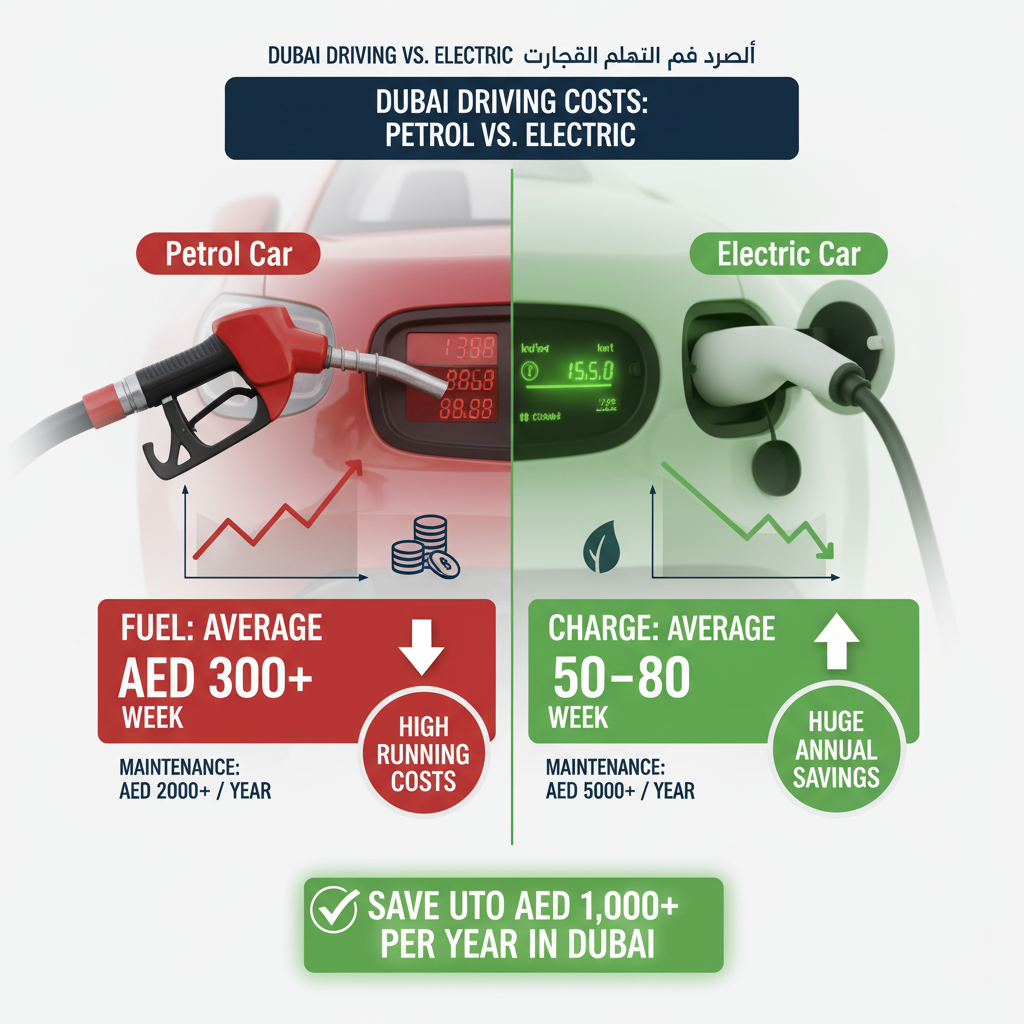
Government Incentives: The Perks of Going Electric
The UAE government and local authorities actively encourage the shift to electric mobility through a range of attractive incentives. These perks further reduce the total cost of ownership and add a layer of convenience to daily life.
| Incentive | Description | Applicable Emirate(s) | Source |
|---|---|---|---|
| Free Public Parking | EV owners can park for free in designated public parking spots. | Dubai | RTA[5] |
| Salik Tag Exemption | EV owners receive a free Salik tag and are exempt from toll fees. | Dubai | RTA[5] |
| Free Public Charging | DEWA offers free charging at public Green Charger stations for non-commercial EV owners until December 31, 2025. | Dubai | DEWA[6] |
| Vehicle Registration Discount | A discount is often provided on the annual vehicle registration/renewal fee. | Dubai, Abu Dhabi | RTA, Abu Dhabi Police |
These incentives are part of the broader National Electric Vehicles Policy, which aims to create a supportive ecosystem for EV adoption across the country, as detailed on the official UAE Government Portal[4].
Reduced Maintenance: Fewer Parts, Fewer Problems
An often-overlooked benefit of EV ownership is the significant reduction in maintenance costs. An internal combustion engine (ICE) has hundreds of moving parts, requiring regular oil changes, filter replacements, and spark plug servicing. An EV motor has a fraction of those parts.
| Maintenance Item | Petrol Car (Typical) | Electric Vehicle (Typical) |
|---|---|---|
| Oil & Filter Change | Every 10,000 – 15,000 km | Not required |
| Engine Air Filter | Every 20,000 – 40,000 km | Not required |
| Spark Plugs | Every 100,000 km | Not required |
| Exhaust System | Prone to rust/damage | Not required |
| Brake Pad Wear | Regular replacement | Significantly less wear due to regenerative braking |
| Coolant System | Regular checks/flushes | Requires checks for battery/electronics cooling, but often less frequent |
| Tire Rotation | Every 10,000 km | Every 10,000 km |
| Battery Check | Annually | Annually (part of main service) |
This simplified maintenance schedule translates to fewer trips to the service center and lower long-term running costs, making the total cost of ownership even more favorable for EVs.
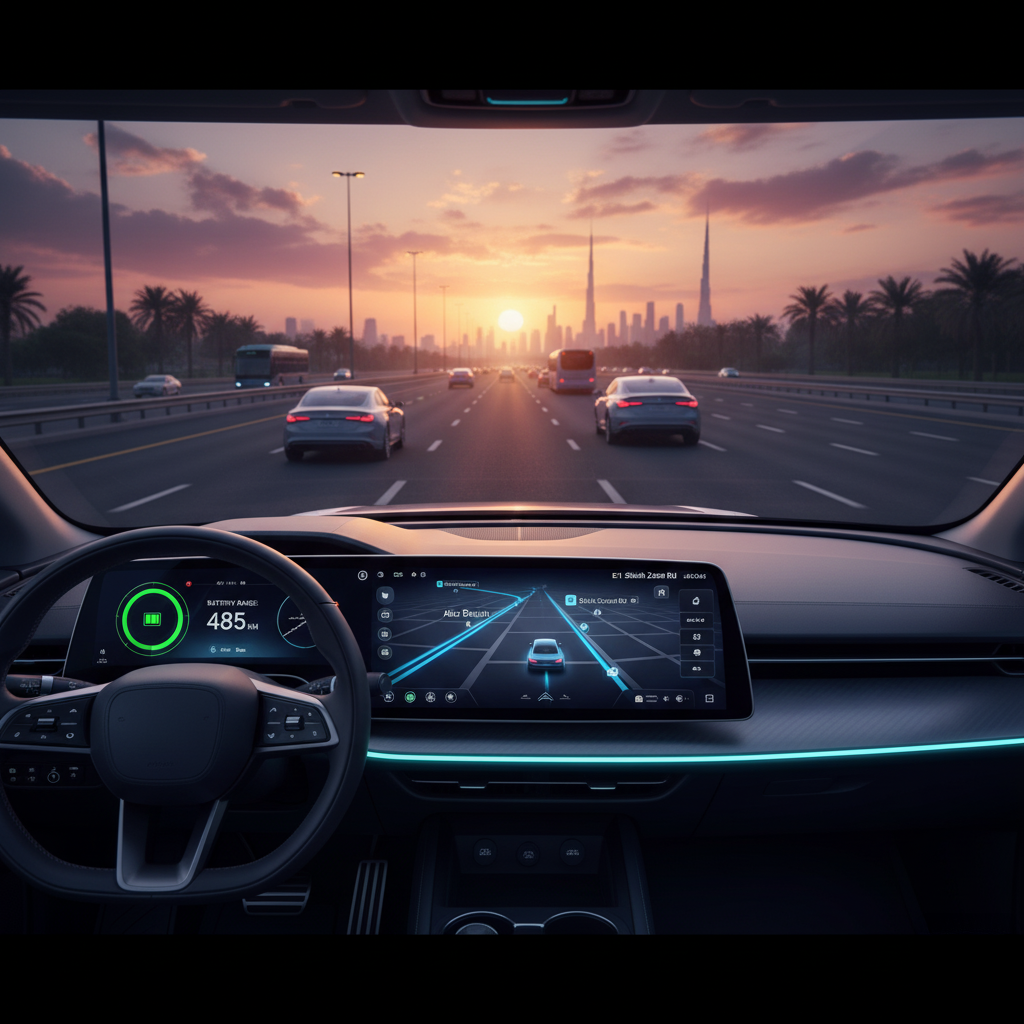
The ‘How’: Your Complete Guide to Charging an EV in the UAE
The biggest question for most potential EV buyers is: “How and where do I charge it?” Fortunately, the UAE has one of the most robust and rapidly expanding charging infrastructures in the region. This section is your step-by-step manual to demystifying the process.
Public Charging: A Step-by-Step Guide
Using a public charger is simple once you’re set up. The UAE has over 400 charging stations, with the network primarily managed by local utility providers in each Emirate.
| Charger Type | Power Output | Cost (DEWA) |
|---|---|---|
| AC Public Charger | 22 kW | 29 fils/kWh |
| DC Fast Charger | 50 kW | 36 fils/kWh |
| DC Ultra-Fast Charger | 150 kW+ | 75 fils/kWh |
In Dubai: Registering for and Using the DEWA EV Green Charger Network
Dubai Electricity & Water Authority (DEWA) runs the extensive “EV Green Charger” network. To use it, you need an EV Green Charger card.
- Get a DEWA Account: You must have an active DEWA electricity and water account.
- Register for the Service: You can register through the DEWA website or their smart app. You will need your Emirates ID and vehicle registration details.
- Pay the Fee: There is a one-time registration fee of AED 520 (inclusive of VAT) to receive your EV Green Charger card[6].
- Charge Up: Once you receive your card, simply tap it on any DEWA charger to begin your session. Billing is consolidated with your monthly DEWA bill.
In Abu Dhabi: Getting Started with ADDC and TAQA
In the capital, the system is managed by the Abu Dhabi Distribution Company (ADDC) and the broader energy company, TAQA.
- Register Your Charger: If you install a home charger, you must register it with ADDC.
- Billing System: For home charger owners, ADDC currently applies a flat monthly fee of AED 92 until a dedicated meter is installed to measure actual consumption[7].
- Public Network: The public charging network in Abu Dhabi is also expanding, with chargers located at malls, government buildings, and key destinations. Users typically use an app or RFID card provided by the network operator to initiate a charge.
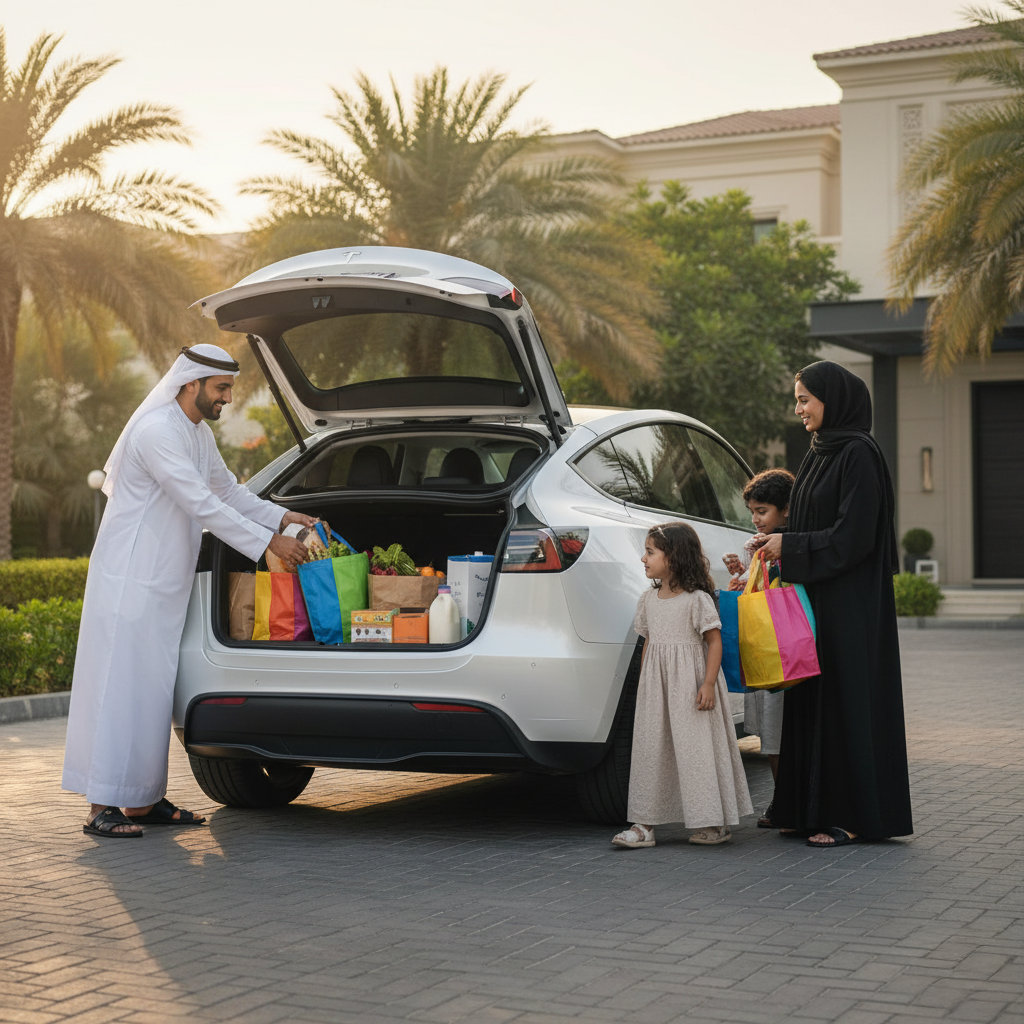
Home and Apartment Charging: Your Personal Fuel Station
The most convenient and cost-effective way to own an EV is to charge it overnight at home, just like your smartphone.
For villa owners, installing a “Wallbox” or Level 2 charger is straightforward. This requires a certified electrician to install a dedicated circuit.
For apartment dwellers, the process has become much easier. New building regulations in Dubai, set by the Dubai Municipality, mandate that 5% of parking spaces must be equipped for green or low-emission vehicles[8].
Checklist for Home Charger Installation:
- Get Approvals: Obtain a No Objection Certificate (NOC) from your building management or developer.
- Select a Charger: Choose a reputable charger brand that is compatible with your vehicle.
- Hire a DEWA-Approved Installer: Use a certified electrician or company to ensure the installation meets all safety standards.
- DEWA Inspection: DEWA will conduct an inspection and install a dedicated meter if required.
- Start Charging: Enjoy the convenience of waking up to a full “tank” every morning.
Finding a Charge Point: The Best Apps and Maps
Range anxiety is a thing of the past thanks to a network of user-friendly apps that show you the location, type, and real-time availability of charging stations.
Top Apps for UAE EV Drivers:
- DEWA Smart App: Essential for Dubai residents to manage their account and find Green Charger stations.
- Electromaps / PlugShare: These global apps have excellent coverage in the UAE, with user-generated reviews, photos, and real-time status updates. They are invaluable for planning longer journeys across different Emirates.
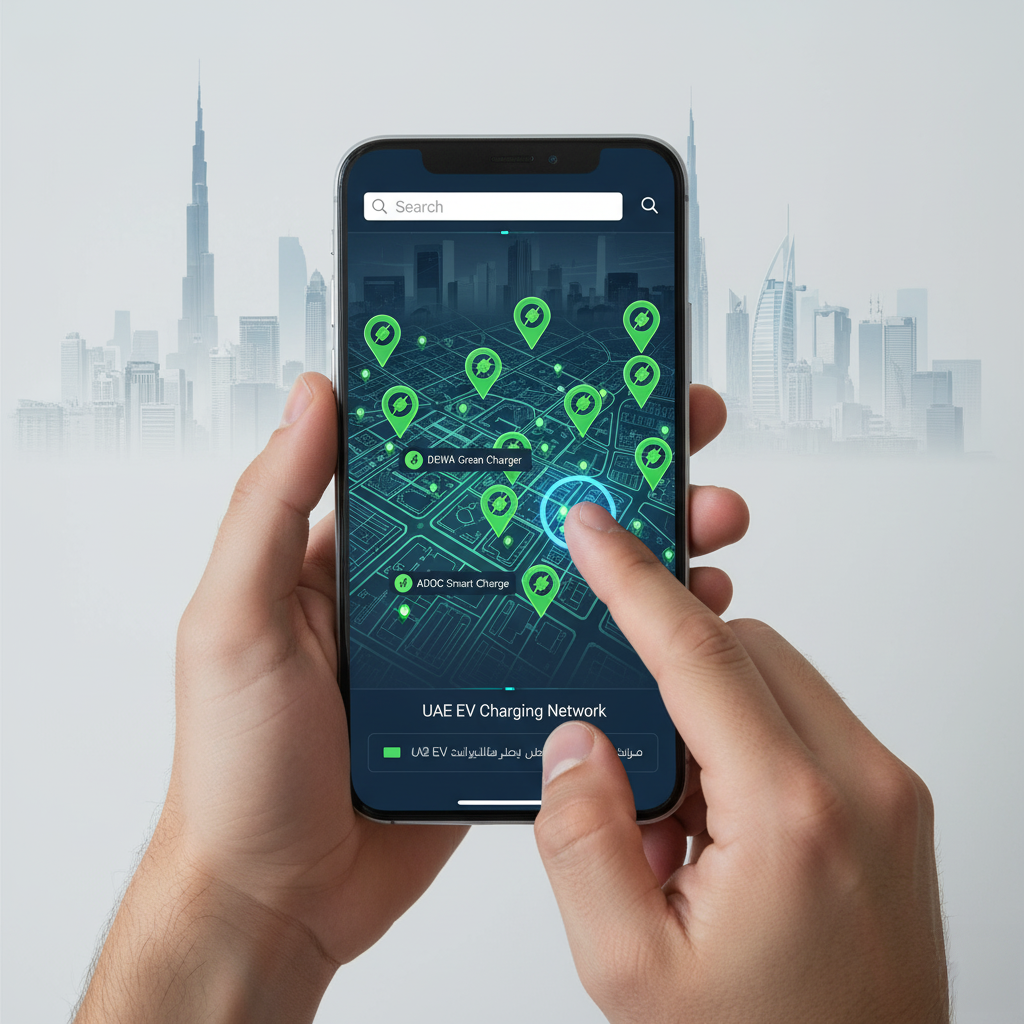
The ‘What’: Choosing the Best Electric Car in the UAE for 2025
The UAE market is now brimming with an exciting range of electric vehicles, from practical family SUVs to high-performance luxury sedans. To help you find the perfect fit, we’ve categorized the top models based on common lifestyles.
| Model | Price (AED, approx.) | Range (WLTP) | 0-100 km/h | Max Charging Speed | Cargo Capacity |
|---|---|---|---|---|---|
| Tesla Model Y LR | 240,000 | 629 km | 5.0s | 250 kW | 682 L |
| BYD ATTO 3 | 150,000 | 420 km | 7.3s | 88 kW | 440 L |
| BMW iX xDrive50 | 430,000 | 630 km | 4.6s | 195 kW | 500 L |
| Porsche Taycan 4S | 450,000 | 463 km | 4.0s | 270 kW | 366 L |
| BYD Seal | 180,000 | 570 km | 3.8s | 150 kW | 400 L |
Best for Families: Space, Safety, and Practicality
For families, the top priorities are space, safety, and practicality. The Tesla Model Y Long Range is a standout choice here. It combines SUV functionality with impressive technology. Its massive 682-liter cargo capacity can easily accommodate strollers, groceries, and luggage for a weekend getaway[9]. With its minimalist interior, large touchscreen, and advanced safety features, it’s a tech-forward vehicle that doesn’t compromise on family-friendly utility.
Best for Luxury & Performance: The Executive Choice
For those seeking premium comfort and exhilarating performance, the UAE market offers some of the world’s best luxury EVs. The BMW iX delivers a futuristic and opulent cabin experience, coupled with a smooth, powerful ride and a long range. For pure driving thrills, the Porsche Taycan remains the benchmark. Its groundbreaking 800-volt battery architecture allows for incredibly fast charging speeds of up to 270 kW, meaning less time waiting and more time enjoying its legendary performance[10].
Best on a Budget: Affordable Entry into the EV World
Going electric no longer requires a top-tier budget. Brands like BYD have introduced highly competitive and feature-packed models that make EV ownership more accessible. The BYD ATTO 3 is a compact SUV that offers excellent value, a modern interior, and a respectable range for daily commuting. For those wanting more performance, the BYD Seal is a game-changer, offering blistering acceleration and sleek styling at a price point that challenges many petrol-powered rivals. BYD UAE often provides attractive financing, with options like monthly payments starting from AED 1,599 for the Seal, making the initial investment easier to manage[11].
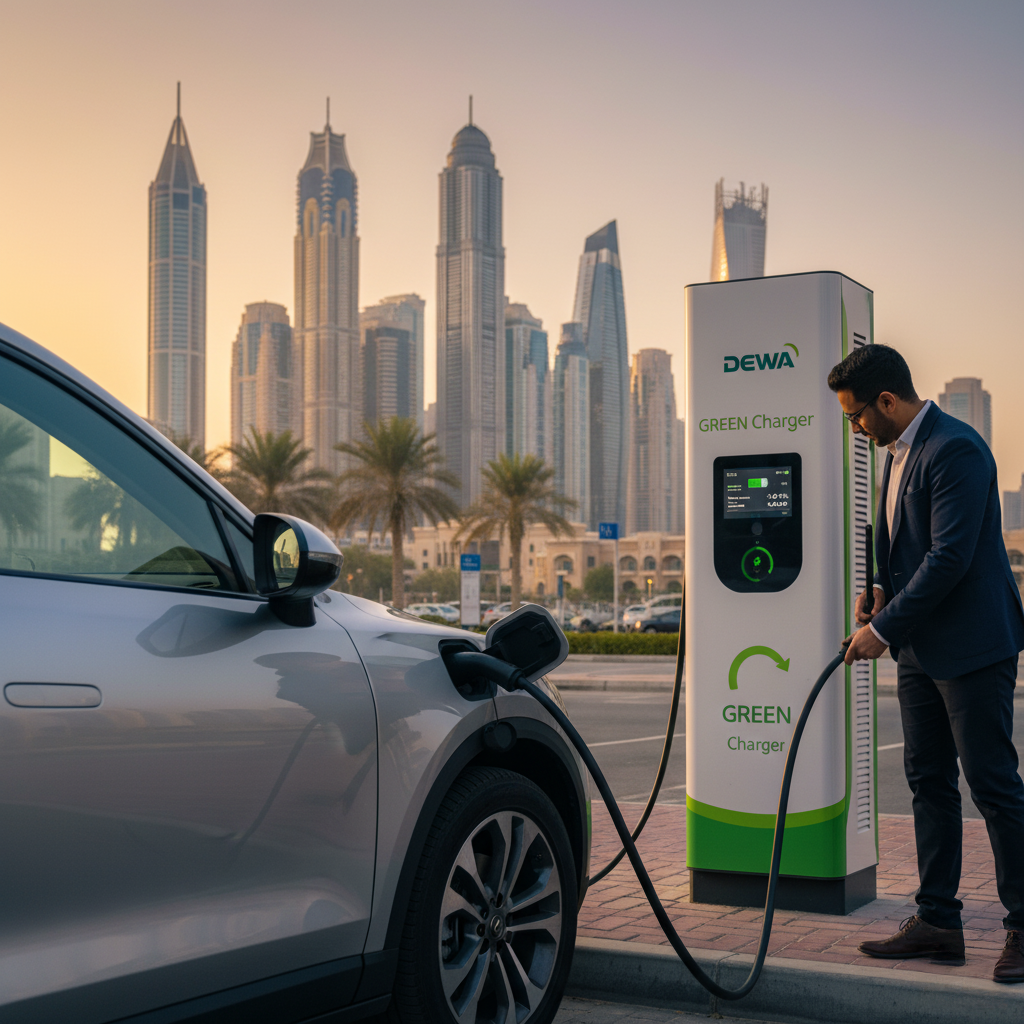
Overcoming EV Concerns: Myth vs. Reality in the UAE
Despite all the benefits, many potential buyers still have lingering concerns. Let’s tackle the most common myths head-on with facts and real-world context for the UAE.
Range Anxiety: Can You Really Drive from Dubai to Abu Dhabi and Back?
Myth: “I’ll get stranded on the E11 because my battery will run out.”
Reality: This is the most common fear, but it’s largely unfounded with modern EVs. The distance between Dubai and Abu Dhabi is roughly 140 km. Most new EVs have a real-world range of 400-600 km. You can easily make the round trip on a single charge with plenty of range to spare. Furthermore, with over 400 charging stations across the UAE, including fast chargers at key locations like petrol stations and malls along the highway, a quick top-up is always within reach.
The UAE’s extreme summer heat does impact range, primarily due to heavy air conditioning use. Most tests show this can reduce range by 10-15%, but even with this reduction, a modern EV’s range is more than sufficient for inter-Emirate travel.
Tips to Maximize Range in the UAE Heat:
- Pre-condition: Cool the car’s cabin while it’s still plugged in.
- Tire Pressure: Ensure tires are inflated to the recommended PSI.
- Smooth Driving: Avoid aggressive acceleration and braking.
- Use ‘Eco’ Mode: Most EVs have a mode that optimizes for efficiency.
Battery Health & Longevity in the Desert Climate
Myth: “The desert heat will destroy the battery in a few years.”
Reality: EV manufacturers have invested heavily in sophisticated battery thermal management systems. These liquid-cooling systems actively work to keep the battery pack at its optimal operating temperature, whether it’s 45°C outside or 15°C. All major EV brands sold in the UAE offer extensive battery warranties, typically covering 8 years or 160,000 km, guaranteeing the battery will retain a significant portion (usually 70%) of its original capacity.
Resale Value and the Used EV Market
Myth: “My EV will be worthless in a few years.”
Reality: While the EV market is still maturing, resale values are becoming more stable. As the technology becomes mainstream and the charging infrastructure grows, demand for used EVs is increasing. The key factor affecting a used EV’s value is its battery health.
What to Look for When Buying a Used EV in the UAE:
- Battery Health Report: Ask for a “State of Health” (SoH) report, which shows the battery’s current capacity compared to when it was new.
- Warranty Status: Check how much time and mileage is left on the manufacturer’s battery and drivetrain warranty.
- Charging History: If possible, check if the car was frequently charged to 100% on a DC fast charger, which can degrade the battery faster than slower AC charging.
- Service Records: Ensure all software updates and required services have been performed.
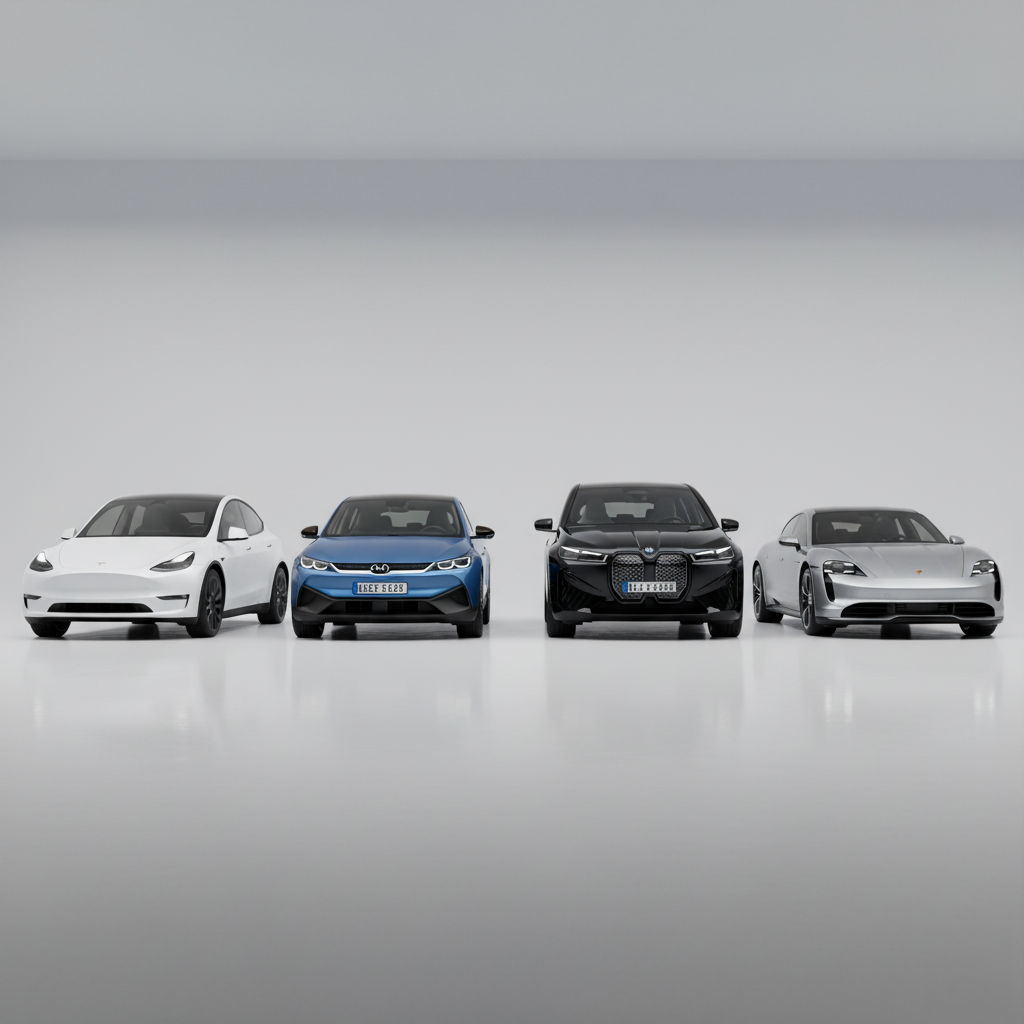
The Future is Now: How the UAE is Leading the EV Revolution
Choosing an EV in the UAE isn’t just a personal financial decision; it’s an investment in a future that the nation’s leadership is actively building. Ambitious government policies and groundbreaking strategies are transforming the country into a global leader in sustainable mobility.
UAE’s National Vision: The Road to 50% EVs by 2050
At the federal level, the UAE’s commitment is clear. The ‘National Electric Vehicles Policy’ is a comprehensive roadmap designed to accelerate the transition away from fossil fuels. A key target of this policy, championed by the UAE Ministry of Energy and Infrastructure, is to increase the share of electric vehicles to 50% of the total vehicles on UAE roads by 2050[4]. This is a core component of the nation’s overarching ‘Net Zero by 2050’ strategic initiative, positioning the transport sector as a critical area for decarbonization.
Dubai’s Blueprint: From Green Taxis to a Zero-Emission Future
Dubai is often at the forefront of this transformation. The Roads and Transport Authority (RTA) has laid out an aggressive timeline with its ‘Green Mobility Strategy 2030’ and the even more ambitious ‘Zero-Emissions Public Transportation in Dubai 2050’ strategy.
Key milestones from these plans include:
- By 2027: The entire Dubai taxi fleet will be converted to 100% hybrid and electric vehicles[5].
- By 2030: 30% of all vehicles procured by the Dubai government will be electric or hybrid.
- By 2050: Dubai aims for its entire public transport network—including buses, taxis, and marine transit—to be 100% free of emissions.
This clear, long-term vision provides confidence to consumers that the infrastructure and support for EVs will only continue to grow stronger.
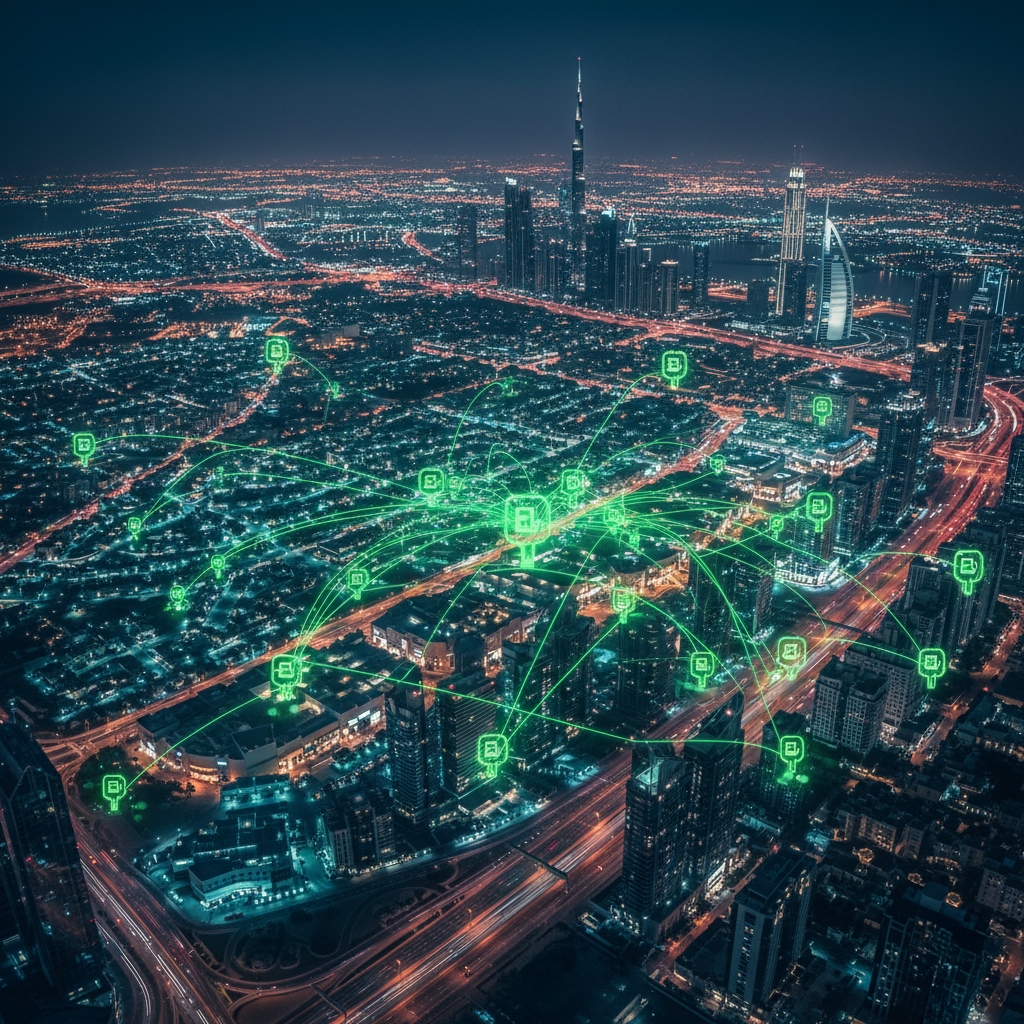
Beyond Batteries: The Role of Hydrogen in the UAE’s Plans
The UAE’s vision for a zero-emission future extends beyond just battery electric vehicles (BEVs). The Dubai 2050 strategy explicitly includes a role for hydrogen fuel cell vehicles (FCEVs)[13].
While a BEV stores electricity in a battery, an FCEV generates its own electricity onboard by combining hydrogen (stored in a tank) with oxygen from the air, with water being the only byproduct. This technology is particularly promising for heavy-duty transport like buses and trucks, where long ranges and quick refueling times are essential. By investing in green hydrogen production, the UAE is diversifying its approach to ensure a truly sustainable and comprehensive future for driving.
Conclusion: Your Journey Starts Now
The evidence is overwhelming. With volatile petrol prices hitting your wallet and a growing awareness of our environmental impact, the question is no longer if you should switch to an electric vehicle in the UAE, but when.
The transition is more than just a smart financial move; it’s a step into a more convenient, quieter, and cleaner future. The myths of range anxiety and charging hassles have been busted by a rapidly expanding infrastructure and incredible advancements in technology. Backed by strong government support and a clear national vision, the UAE has firmly established itself as one of the best places in the world to embrace the electric revolution.
This guide has given you the map, the data, and the tools. You understand the savings, you know how to charge, and you’ve seen the best models the market has to offer. The road ahead is electric.
Ready to make the switch? Explore our detailed comparison of the top EV models available in the UAE today and use our savings calculator to see how much you could save this year.
Sources
- IQAir. (2025). Air Quality in Dubai, United Arab Emirates. Retrieved from https://iqair.com/us/united-arab-emirates/dubai
- World Health Organization (WHO). (N.D.). WHO global air quality guidelines. Retrieved from https://who.int
- The Official Platform of the UAE Government. (N.D.). National Electric Vehicles Policy. Retrieved from https://u.ae/en/about-the-uae/strategies-initiatives-and-awards/policies/transport-and-infrastructure/national-electric-vehicles-policy
- Dubai’s Roads and Transport Authority (RTA). (N.D.). RTA Initiatives & Strategies. Official RTA publications.
- Dubai Electricity & Water Authority (DEWA). (N.D.). EV Green Charger. Retrieved from https://dewa.gov.ae/en/consumer/ev-community/ev-smart-charging
- Abu Dhabi Distribution Company (ADDC). (N.D.). EV Charger Registration and Billing. Official ADDC publications.
- Dubai Municipality. (N.D.). Green Building Regulations. Official Dubai Municipality publications.
- Tesla, Inc. (N.D.). Model Y Specifications. Retrieved from https://tesla.com/en_ae
- Porsche AG. (N.D.). Taycan Specifications. Official Porsche websites.
- BYD UAE. (N.D.). BYD Models and Financing. Retrieved from https://byduae.ae
- UAE Ministry of Energy and Infrastructure. (N.D.). Global EV Market Project. Official ministry publications.
- Hydrogen Industry Leaders. (N.D.). Dubai unveiling zero-emission public transport initiative by 2050. Retrieved from https://hydrogenindustryleaders.com



